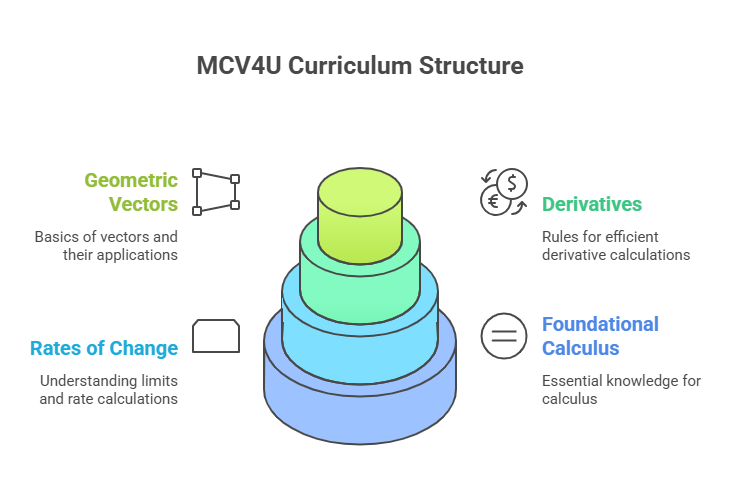Key Highlights of MCV4U Curriculum
Here is a quick look at what you will get in this guide:
- The MCV4U course, made for the Ontario curriculum, teaches grade 12 students about advanced calculus and vectors.
- You will learn about rates of change, ways to use derivatives polynomial functions with different functions, and see how derivatives can be used in real life.
- You get to know geometric and algebraic vectors, and also see how to work with vectors in 3D space.
- The mcv4u course outline wants you to build problem-solving and critical thinking skills. These be important if you go to college or university after high school.
- Doing well in this class can help when you send in your college or university applications, like in science, engineering, and business. Your strong marks can help with programs that want good English skills. Some places might look at IELTS Edmonton scores.
- Mostly, student’s achievement comes from your work in class, which count as 70%, and your final exam, which count as 30%.
Introduction
Welcome to your guide on the MCV4U curriculum, which covers the Grade 12 Calculus and Vectors course. This course is an integral part of the Ontario curriculum, designed for students aiming to pursue science, engineering, or business at the university level. In this article, we will explore the MCV4U course outline, including core topics, curriculum expectations, and assessment methods. Whether you’re a student, parent, or teacher, this guide will provide essential tips for success in the MCV4U curriculum.
What is MCV4U Curriculum? Understanding Ontario’s Grade 12 Math Course
The MCV4U curriculum, established by the Ontario Ministry of Education, is designed for Grade 12 students to build on Advanced Functions (MHF4U). This course enhances students’ developing understanding of rates of change and functions, preparing them for further studies in senior mathematics, calculus, linear algebra, or physics.
It focuses on problem-solving skills and real-life applications of mathematics, including the use of the mathematical processes. Students will explore vector representation, calculate derivatives, and tackle rate-of-change problems. By the end of the course, the MCV4U curriculum aims to strengthen your mathematical abilities, ensuring success in university-level studies.
Complete MCV4U Curriculum Structure and Course Units

The MCV4U course outline consists of approximately 110 hours of class time divided into units. Initially, you’ll cover foundational knowledge essential for calculus, followed by learning about rates of change, derivatives, and their applications. The second part focuses on vectors, exploring their definitions, representations of lines, and mathematical uses, concluding with lines and planes. This structure ensures a solid calculus foundation before tackling more complex vector concepts. Each unit aligns with the curriculum expectations from the Ministry of Education, with topics sequenced logically to build on prior knowledge. Further details are provided in the subsequent sections.
MCV4U Unit Breakdown: Rates of Change and Derivatives
- In the first unit of MCV4U, you’ll explore rates of change, including the important concept of a rate of change by understanding limits and distinguishing between average (secant line) and instantaneous (tangent line) rates of change.
- You’ll learn to calculate both types of rates of change in various situations, laying the foundation for derivative concepts.
- The unit introduces derivative rules for polynomial functions, such as the Power Rule, Product Rule, and Quotient Rule, making calculations more efficient.
- Mastery of these concepts is essential, as derivatives help solve real-life problems involving speed, acceleration, and other changing quantities.
MCV4U Geometric Vectors and Applications Unit
- Learn the basics of vectors quantities with both size and direction and distinguish them from scalars (simple numbers).
- Practice adding, subtracting, and scaling vectors visually and algebraically in both two- and three-dimensional space using coordinates.
- Apply algebraic rules to vectors for easier calculations, moving from diagrams to numeric solutions.
- Explore real-world applications of vectors, including force, velocity, torque, and use the dot product and cross product for solving physics and geometric problems in 3D space.
Essential MCV4U Curriculum Topics Students Must Master
To achieve a high level in MCV4U, students must master key topics in calculus and vectors. The curriculum emphasizes not just problem-solving, but also a deep understanding of the underlying concepts, which is essential for tackling more complex questions. Your final grade will greatly depend on how effectively you apply mathematical processes such as problem-solving, reasoning, and articulating your thought process. The following sections will outline the crucial calculus and vector topics that form the foundation of the course and are vital for your success.
MCV4U Calculus Topics: Limits, Derivatives, and Applications
The calculus section of MCV4U builds a strong foundation for university-level math, focusing on understanding rates of change. You begin with limits, leading to the concept of derivatives. The course covers rules for finding derivatives of polynomial, trigonometric, exponential, logarithmic, and radical functions. You’ll apply derivatives to curve sketching and solving optimization problems, like finding maximum or minimum values. Mastering these topics connects all major course ideas and prepares you for future math courses.
Key calculus ideas are:
- Limits and continuity
- First and second derivatives and their graphical meaning
- Differentiation rules (Product, Quotient, Chain)
- Using derivatives for optimization and related rates
MCV4U Vector Topics: 2D/3D Vectors and Geometric Applications
The vector section of MCV4U is vital for building a foundation in topics useful for physics, engineering, and linear algebra. You’ll explore how vectors work in both two- and three-dimensional space, understanding operations like dot product and cross product. The course teaches how to convert between geometric and algebraic representations of vectors, and why these concepts matter such as finding angles or areas. These skills are essential for working with lines and planes in 3D.
The important vector topics covered are:
- Vector and scalar quantities, and their operations
- Cartesian vectors in 2-space and 3-space
- Dot product and cross product with applications
- Vector, parametric, and symmetric equations of lines and planes in 3D space
MCV4U Curriculum Assessment and Evaluation Methods
The Ontario Ministry of Education outlines evaluation methods in the “Growing Success” document for the MCV4U course. The aim is to enhance student learning, including a student’s learning, through regular feedback on strengths and areas for improvement, particularly in the context of their achievement of curriculum expectations. Teachers employ various strategies to assess your knowledge and determine your level of achievement. Your final grade considers your entire semester’s work, focusing on the achievement chart categories: Knowledge, Thinking, Communication, and Application, while emphasizing consistent and recent performance.
MCV4U Grade Distribution and Testing Format
The grade distribution in MCV4U is designed to reflect your overall mathematical ability, using a blend of assignments, quizzes, and tests throughout the term. Your final student’s grade combines term work (about 70%) and a final evaluation (about 30%), rewarding consistent performance across various tasks, while giving special consideration to more recent evidence of achievement. A final percentage grade will assess your skills in four achievement chart categories: Knowledge and Understanding, Thinking/Inquiry, Communication, and Application. This balanced approach ensures that you are evaluated not just on memorization, but also on problem-solving, communication, and practical application.
Achievement Category | Description | Typical Weighting |
|---|---|---|
Knowledge and Understanding | Subject-specific content and comprehension of concepts. | 25-30% |
Thinking/Inquiry | Use of critical and creative thinking skills to solve problems. | 20-30% |
Communication | Conveying mathematical thinking clearly and logically. | 20-25% |
Application | Using knowledge and skills in different contexts. | 25-30% |
MCV4U Final Exam Weight and Course Requirements
- The final exam in MCV4U is crucial, accounting for 30% of your final grade and covering all course topics, from rates of change to vectors.
- To pass, you must achieve at least 50% overall and complete 110 hours of planned learning activities.
- Schools like USCA Academy require students to keep a learning log to track these hours and ensure all curriculum expectations are met.
- Consistent review and practice throughout the course will help you succeed on the final exam and prepare for university-level math.
University Prerequisites: How MCV4U Curriculum Prepares Students
MCV4U is a key part of university preparation math. Many students need to take this course to get into the program that they want. The mcv4u prerequisites for many university courses include this one. You can also see MHF4U (Advanced Functions) needed before you take MCV4U.
There are jobs in engineering, computer science, and the physical sciences that use what you learn in this course. You will see areas of business and economics start to ask students to take MCV4U too. The course helps you understand and work with numbers in a deeper way. This is useful for modeling in lots of fields. You also need this course if you plan to study calculus, linear algebra, or a physics course when you get to university.
MCV4U Requirements for Engineering and Science Programs
- MCV4U is required for most engineering and science university programs in Ontario.
- Admissions teams closely consider your performance in MCV4U to assess your readiness for math-heavy courses.
- Topics like derivatives, integrals, and vectors are essential for physics and engineering, making MCV4U a key prerequisite.
- You must complete Advanced Functions (MHF4U) before or alongside MCV4U; passing both is crucial for your Ontario Secondary School Diploma and university eligibility.
MCV4U Business and Mathematics Program Prerequisites
- MCV4U isn’t just for science and engineering; it’s now crucial for many business and math programs at university.
- Programs like finance, economics, and analytics require advanced math skills, including calculus concepts such as derivatives and optimization.
- Success in MCV4U shows you can handle abstract and challenging thinking, which universities value for programs like Bachelor of Commerce, economics, and financial mathematics.
- Before applying, check university prerequisites MCV4U may boost your eligibility and open doors to top business and math courses.
MCV4U Curriculum Study Strategies and Success Tips
Success in MCV4U goes beyond knowing formulas; it requires effective learning and strong critical thinking skills and problem-solving abilities. Employing the right study methods enhances understanding and can improve your final grade. Engage actively with the material by practicing problem-solving strategies, asking questions when needed, and understanding the underlying concepts. The following sections will provide specific problem-solving strategies and resources to support your success in this challenging course.
Effective MCV4U Study Methods and Resources
Adopting good learning activities is important in MCV4U. Practice often and avoid letting homework pile up try problems from each lesson each time. This builds understanding and confidence. Study groups help, as explaining ideas to others checks your knowledge.
There are many helpful resources. The “McGraw-Hill Ryerson Calculus and Vectors 12” textbook fits the course well. Use websites like Desmos to explore graphs. Schools such as USCA Academy and Christian Virtual School offer course outlines on their sites.
Learning activities:
- Go over and rewrite your notes after each class.
- Do every practice problem, not just assigned ones.
- Watch online video lessons for tough topics.
- Work with a group to discuss and solve problems together.
Common MCV4U Challenges and How to Overcome Them
Many students find MCV4U challenging because the math concepts can be hard to visualize and the class moves quickly. It can be confusing to connect different ideas, like understanding how limits relate to derivatives. Instead of memorizing formulas, focus on seeing the links between topics and use critical thinking. Problem-solving is tough when questions require multiple steps or concepts. Break problems into smaller parts if you get stuck. Asking teachers for help makes a difference, as student feedback shows. Supportive schools like USCA Academy offer extra help when needed.
Here are ways to deal with common challenges:
- Don’t fall behind. Pace yourself and review material daily.
- Ask for help immediately when you don’t understand something.
- Practice a wide variety of problems to see concepts in different contexts.
- Focus on understanding the “why” to make the “how” easier to remember.
Conclusion
To sum up, it is crucial for every student to grasp the MCV4U curriculum to excel in Grade 12 Calculus and Vectors. This course equips you with essential concepts such as derivatives and geometric vectors, while also preparing you for university. Understanding the key ideas from this curriculum enhances your problem-solving and analytical thinking skills, benefiting you both now and in the future.
Developing good study habits and recognizing common challenges can further improve your learning experience and meet the needs of students. If you have questions or need assistance with the MCV4U course, reach out to us at USCA Academy. We provide tailored support to meet your needs.
Frequently Asked Questions
1. Is MCV4U required for Ontario university engineering/science programs?
Yes, you need to have MCV4U if you want to get into engineering and science programs at all Ontario universities. MCV4U is important because it is seen as the main university preparation math course. A good mark in this math class is one of the top prerequisites for anyone who wants to study or work in these fields.
2. Can the MCV4U course be completed online and how does it differ from in-person learning?
Yes, you can take an mcv4u online course with trusted schools like USCA Academy. These online courses give you more freedom with your time. You can learn when you want and move at your own speed, and the course accommodates individual education plan requirements. The course covers the same things as classes at a high school, but doing it online needs you to keep yourself on track. Still, you get the same credit toward your diploma when you finish.
3. How does the MCV4U curriculum align with post-secondary mathematics programs?
The MCV4U course lines up with what you need for post-secondary math. It brings in the main ideas of calculus and vectors. This university preparation math course goes over limits, derivatives, and vector algebra. These are the first topics you will get to in university calculus, linear algebra, and even physics. The course helps to make sure students will be ready for harder work ahead.









